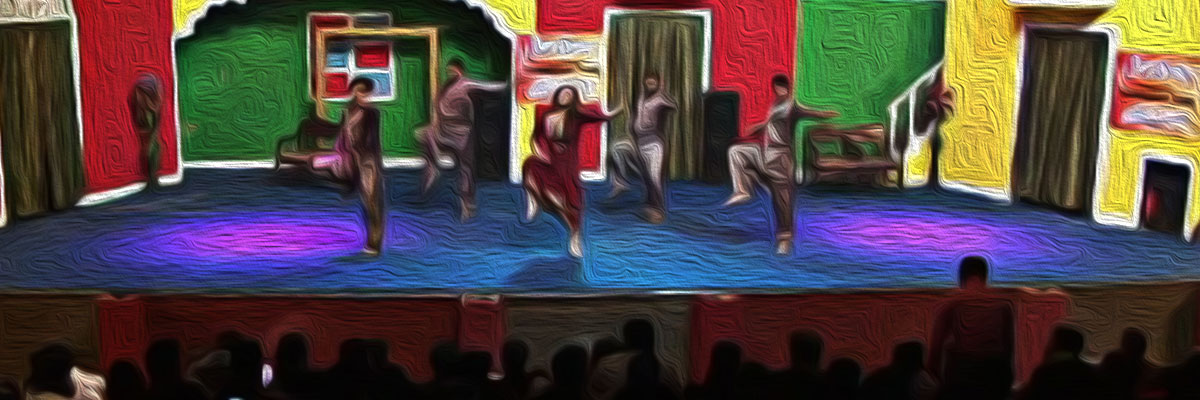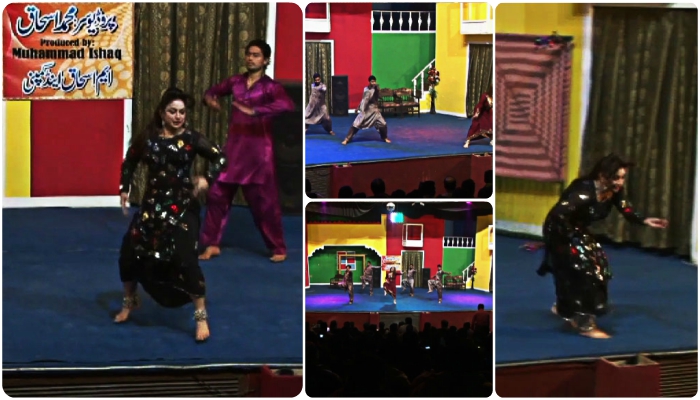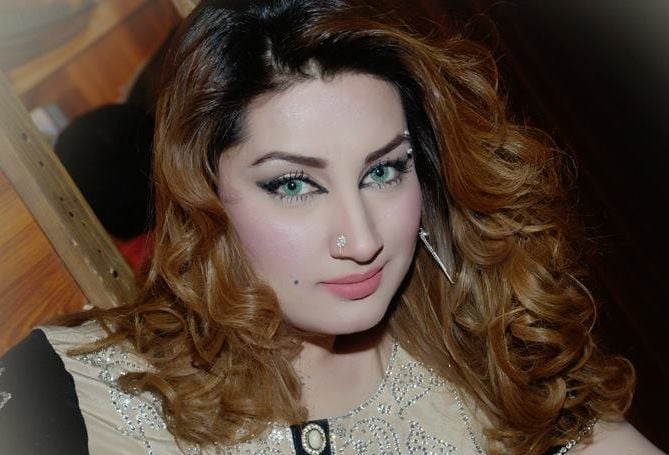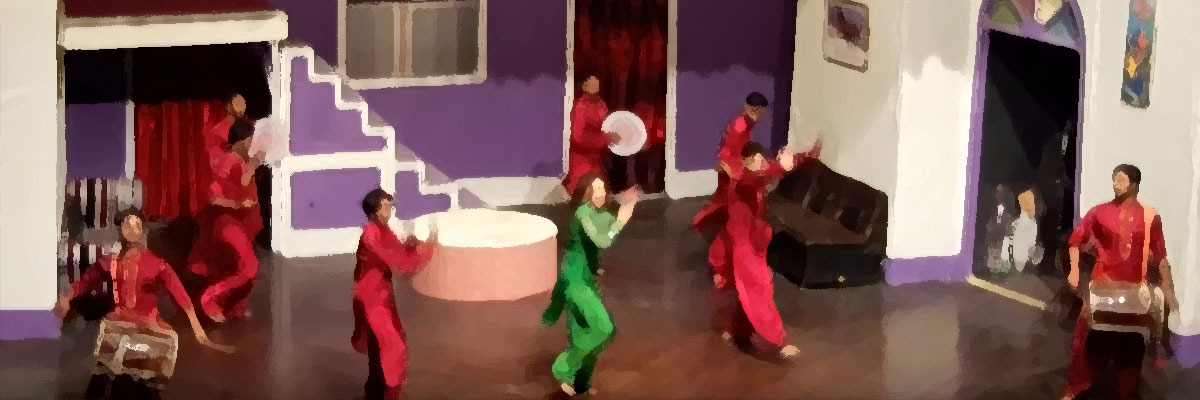It’s 11:00 p.m. on a blistering cold January night in Lahore. Inside the Mehfil Theatre, a young boy works furiously to complete the full masquerade of makeup - with over-arched eyebrows and false eyelashes. He backcombs the hair into a large fuzz. Once dolled up, Nida Chaudhry admires her short, curvy body, standing against a worn-out, cracked mirror on a wall with crumbling paint and black mold.
It’s show time.
The play on stage, a mix of comedy and drama, halts abruptly as the Bollywood chartbuster Mahi Ve blares out from the speaker. On this background score, Chaudhry struts onto the stage, in a glittery ensemble, followed by six identically dressed male dancers. The crowd erupts into a frenzy. This is what they had been waiting for. This is what they paid for.

Undeniably, Chaudhry is the star of the night. For the next four minutes, she twirls and sashays with gazelle-like ease across the wooden platform, dancing suggestively, seductively, to the delight of her all-male audience. At one point during the performance, a man seated in the front row beckons her to come down. She ignores him. But the lewd gestures continue. Then, visibly upset, she walks up close to him, licks her fist and gives him a thumbs-down. The fans roar. Two hours, two performances and two costume changes later, Chaudhry is ready to call it a night. “It’s cold,” she says wrapping herself in a shawl, “It’s so cold tonight.” As she opens the backdoor, a loud qawali can be heard playing at a shrine next door. She covers her head, hops into a Toyota Land Cruiser and leaves.
Chaudhry was 14-years-old when she first began preforming on stage, after a friend, who she met at a beauty parlour, encouraged her. “I was very young,” she recalls, “I loved dancing, so I thought why not? The audience loved me.” Someone recorded the show. The CD made it to a local film shop and soon producers were offering her jobs.
Her father, a small time comedian, was furious. He threatened to douse her face in acid, if she didn’t quit. The teenager fled her house. Finally, several months later, the father and daughter reconciled after their family members intervened. “I don’t think he ever got over it,” she says averting her gaze, “The sadness drove him ill. For eight years he was bed ridden due to paralysis. I took care of him and the rest of the family. I became the son.”
Today, the 29-year-old can make up to Rs. 300,000 for a 16-day show. Other senior artists, such as Nargis, are known to charge Rs.100,000 per day. While most stage plays are held in Lahore, Chaudhry has performed for audiences in other cities of Punjab, as well as outside Pakistan, in London, Maldives and Dubai over the last 15 years. Little is known about the evolution of this form of Pakistani theatre, where the script is secondary to the dances. But they are popular, insists the starlet, because they provide a cheaper form of entertainment. Tickets sell for as low at Rs.300. Commercial theatre can otherwise cost Rs.1,000 and beyond per seat.
But that may not be the only thing that draws spectators to these shows. It’s an industry run by men, for men, using women. Although, Chaudhry and her colleagues refer to themselves as “artist,” for the people around them they are the dancing girls and their performances are pejoratively referred to as mujras. Yet, Chaudhry insists she feels no shame in what she does. “Don’t Bollywood actresses do this? If I was educated I could have been a teacher. But I am not.”
Girls who enter the industry are either runaways or from adjoining villages looking to make it big in the city as models or movie actresses. “It’s always a combination of passion and helplessness,” says a director who asked not to be named. Newcomers can be as young as 16 and are initially only paid Rs. 5,000 for transportation.

While none of the women, be it novice starlet or a veteran of the circuit, talk about it openly, it is no secret that some female leads are known to extend favours to their male patrons and show-runners to make a few extra bucks or to gain a leading role in the next big stage production. There is another more dangerous reality to this business that has been rearing its ugly head recently more often than not. The stage entertainment industry, unregulated and unorganized, has become fraught with risks that often prove fatal for the actors, particularly the women.
In November last year, actress Kismat Baig, known locally as “dancing doll,” was shot twelve times in the legs, stomach and hands as she was on her way home in Lahore. Her murder made it to public airwaves, which was rare for the industry to make it to the local news. Outraged, and shaken, her colleagues came out on the streets to protest the lack of security provided by the state.
The police later concluded that her boyfriend, a businessman from Faisalabad, hired assassins to kill Baig when she tried to end their relationship. Rana Sanaullah, Punjab’s law minister, brushed aside the killing as a personal matter. The case was closed. No further queries were made. And no security plans were chalked out for the others working in the profession. A month earlier, another stage actress was shot mid-performance in Faisalabad, after the organisers stopped a group of men from approaching the actress.

Mahnoor, who came to Lahore from Sialkot, was one of Baig’s closest friends. These days, she finds it hard to perform on stage. “It is very scary,” she tells Geo.tv over the phone.
“So what if Baig was someone’s mistress or that a man gave her money to run her house? None of it means that you own that person or put bullets in them. I also have such friends, but I try to be careful.”
After the killing, Chaudhry, who lives with her younger sister in one of the posh localities in Lahore, has installed security cameras around her house. Two guards are posted at her gate at all times. She doesn’t take calls from numbers she doesn’t recognise. As a rule she has always avoided preforming at private events or weddings. “Men get really drunk at these parties. Then they start firing in the air and become unruly. You never know what might happen,” she explains.
“Although a lot of money is offered, I avoid it. But sometimes, if you refuse, they blackmail you.” Chaudhry says she pays out of her pocket to ensure her family is kept safe.
Since 2012, eight stage actresses have been killed in Punjab, either by their estranged lovers or due to reasons unknown. The most recent target-killing was reported from Jhang last week. While these murders made it to local news, many others didn’t.
Lahore is the biggest market for these shows. The city has 10 theatres, both government and privately-owned, that host such performances. None have any security cover. Outside the Mehfil Theatre, where Chaudhry preforms regularly, a ticket seller and a wafer-thin boy man the entrance. “Each night my family wonders if I will return home,” says Kareena Jan, who worked for several years as a dancer at a club in Dubai before moving back. “I have thought of leaving. I’ve worked so hard to get here. What else would I do?”
Astonishingly, the women fear the censors perhaps just as much as bullets. If, and when, the provincial government’s department of arts and culture decides to enforce a ban for acts considered vulgar or provocative, the dancers can end up going home empty handed. When that happens, they are forced to look elsewhere for some quick cash, which in turn only increase the risk to their lives even more.

Overlooking the Mall Road, the majestic Alhamra in its red-brick façade is a glorious structure designed by the renowned architect, Nayyar Ali Dada. In the daytime, its three auditoriums play host to a raft of literary events, refined cultural events and dramatic arts. However, at night, post 10 p.m., the halls are reserved for stage shows. Subha Sadiq, Alhamra’s spokesperson, admits these shows attract “a crude crowd” but they also get handsomely paid by the show organisers for the space. For a bulk booking of shows running up to 16 days, the venue charges up to Rs.500,000 for each hall. Even then, before allotting space, women are directed not to wear tight leggings, show any bare skin, or gesture to the audience without a male actor present on stage. “If they don’t follow our rules we ban them from preforming,” says Sadiq. It is a complicated web of men who are either jilted lovers, disapproving family members, government officials or fans.
Back at the Mehfil Theatre, for a second show on another January evening, 29-year-old Chaudhry is running a finger through her new wardrobe as a cleaner kicks up dust behind her. She admits that the unpredictability and danger can be overwhelming at times, but the show must also go on. Then, smiling, she looks directly into the camera, “Is there any woman in the world who is not scared? Every woman is scared, for one reason or another.”


